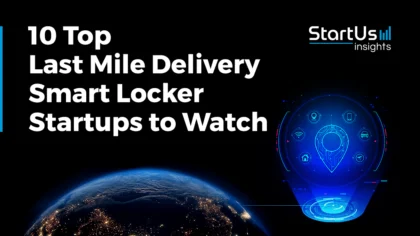Accelerate Productivity in 2025
Reignite Growth Despite the Global Slowdown
Staying ahead of the technology curve means strengthening your competitive advantage. That is why we give you data-driven innovation insights into the logistics industry. This time, you get to discover 5 hand-picked warehouse management startups.
Out of 1 287, the Global Startup Heat Map highlights 5 Top Warehouse Management Startups
The insights of this data-driven analysis are derived from the Big Data & Artificial Intelligence-powered StartUs Insights Discovery Platform, covering 2 093 000+ startups & scaleups globally. The platform gives you an exhaustive overview of emerging technologies & relevant startups within a specific field in just a few clicks.
The Global Startup Heat Map below reveals the distribution of the 1 287 exemplary startups & scaleups we analyzed for this research. Further, it highlights 5 logistics startups that we hand-picked based on criteria such as founding year, location, funding raised, and more. You get to explore the solutions of these 5 startups & scaleups in this report. For insights on the other 1 282 warehouse management startups, get in touch.
PULPO WMS enables Warehouse Automation
Manual warehouse management results in inconsistencies and errors. These include incorrect handling of products due to a lack of proper information, delivery of the wrong products, and lack of transparency regarding quantities. To resolve this issue, startups are developing warehouse automation solutions that accelerate the completion of tasks and enable better planning. For example, handling a product based on its limitations due to the weight or keeping it in a special zone due to its chemical nature.
Based out of Germany and the US, PULPO WMS is a warehouse automation startup. The startup’s software informs staff which supplier or production line will deliver products and in what quantity. This allows for quick verification to initiate the warehousing or send-back process. Based on user-defined rules, the software automatically creates warehousing tasks to move the products to their optimal positions. Additionally, the solution provides shipping labels for every box to ensure the delivery of the right products in the correct quantity.
Portable Intelligence provides Warehouse Workforce Management
Managing the workforce that constantly deals with the products in the warehouse is as important as tracking the products themselves. Hence, startups are offering workforce tracking software. These solutions allow warehouse managers to distribute tasks among the workers considering factors such as workload, productivity, and present location in the warehouse. This eliminates the underutilization of labor and improves overall workforce productivity.
Canadian startup Portable Intelligence manages the warehouse workforce through its task distributor app, Task Engine Distributor (TED). It decides which orders are to be picked first and how to allocate the tasks throughout the day. TED monitors and ranks the employees, and automatically assigns a priority order to a highly productive employee. As TED constantly monitors the position of employees in the warehouse, it allocates tasks based on their proximity to the stock-keeping unit (SKU).
Jugo Systems streamlines Inventory Management
Inventory management is an integral part of warehousing. However, it poses challenges such as difficulties in locating or identifying items in the inventory. This becomes a hurdle in shipping products on time, and thus, can affect business reputation. To avoid these issues, startups are developing inventory management solutions that enable the managers to streamline deliveries and dispatches while also keeping a tap on due dates and discrepancies.
Jugo Systems is a UK-based startup that provides an inventory management solution. The startup’s software allows managers to assign barcodes and images to inventory items. This allows staff to quickly identify the correct items. Moreover, the software segments orders by their due date and urgency before sending them for picking. Further, it consolidates multiple orders to avoid wastage of time by re-visiting the same locations. Additionally, it overlays the average daily sales and predicts what needs to be ordered.
LeafClover Technology offers End-to-End Warehousing
Activities inside a warehouse include receiving goods, processing them, packing them for shipment, and finally, dispatching them. However, keeping a tap on the status of all these processes manually is very complex and often leads to inefficiencies. To address this problem, startups are developing end-to-end warehouse management systems that enable transparency by giving the managers real-time updates — even when they are not on site.
Malaysian startup LeafClover Technology facilitates end-to-end warehousing. It allows users to receive real-time updates on stock balance, product traceability, and stock movement. The web application dashboard comprises the activity that should be completed to achieve the process goal. Further, the process status captures the inbound and outbound picking until a shipment is complete. Additionally, the product can be launched from any desktop, laptop, tablet, or smartphone as it is a cross-platform responsive web application.
PADIS advances Product Tracking & Packaging
Tracking the materials or products in an inventory is imperative for enabling smart warehousing. As a result, startups are providing warehouse logistics software applications that utilize quick response (QR) codes and scanners. This enables workers to receive the details about a product by a simple scan, quickly find a required product, and update the inventory database by registering the order numbers of the dispatched items.
PADIS is a German startup that advances product tracking and packaging. Its application consists of a mobile data acquisition (MDA) scanner that allows inventory workers to see which delivery orders they have to complete and where the needed items are located. The solution scans the QR code of the removed item and registers its numbers, keeping the inventory updated at all times. After scanning the order number, the system prints out the appropriate delivery notes and parcel labels for efficient packaging.
Discover more Logistics Startups
Logistics startups such as the examples highlighted in this report focus on quality management, supply chain management, and warehouse dimensioning. While all of these technologies play a major role in advancing the logistics industry, they only represent the tip of the iceberg. To explore more logistics technologies, simply get in touch to let us look into your areas of interest. For a more general overview, you can download our free Logistics Innovation Report to save your time and improve strategic decision-making.








